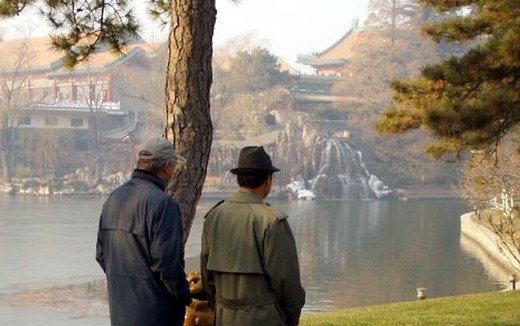 |
|
Top South Korean delegate Chun Young-woo (right) and his U.S.counterpart Christopher Hill in Beijing in December 2006. Photo courtesy of the Foreign Ministry.
|
Japan still balks on issue due to unresolved kidnappings
Wu Dawei, China’s chief negotiator at the six-party talks to end North Korea’s nuclear program, indicated on February 5 that providing energy aid to North Korea would be the biggest issue at the third-stage meeting of the fifth round of six-nation talks, slated to resume on February 8. Wu said that three days would be enough, stressing the necessity of progress at the six-party talks, reported Japan’s Kyodo News, quoting Noda Takeshi, a member of Japan’s Liberal Democratic Party (LDP). Noda had met Wu earlier that day. However, according to Noda, Wu mentioned the possibility that the talks would be prolonged due to the energy issue. Wu’s anticipation of a long meeting apparently stems from the fact that the six nations participating in the talks - the two Koreas, the U.S., Japan, Russia, and China - have not yet reached an agreement on the energy issue. Japan in particular has openly expressed disapproval about providing heavy oil aid to North Korea. Should the North give up its nuclear weapons program, energy aid ideas being thrown around include the provision of heavy oil or a light-water nuclear reactor, or energy from South Korea.But Japan is currently pressing for resolution in the issue of several kidnappings of its citizens by North Korea. During a press conference on February 5, Japanese Prime Minister Abe Shinzo said, "If Pyongyang doesn’t show a sincere reaction about its kidnapping of Japanese citizens, it will be basically impossible for Japan to suggest any [aid plan]." These comments mean that Christopher Hill, the chief U.S. negotiator at the North Korean nuclear talks, failed to persuade Japan to come to the ‘energy aid table’ during his visit to Japan, which ended February 5. According to Bloomberg, Hill, at a press conference in Tokyo that day, said that he believed North Korea is ready to negotiate at the next round of six-party talks, but if North Korea wants energy or economic aid, it should completely abandon its nuclear ambitions. The United States reportedly tapped the opinion of South Korea indirectly regarding the energy aid problem, as well. U.S. Ambassador to Seoul Alexander Vershbow visited South Korean Unification Minister Lee Jae-joung to ask what would happen regarding energy aid to North Korea if the six-party talks progress smoothly. In response, Minister Lee replied, "We can consider gradual aid, but it should come after inter-Korean dialogue," according to an official of the ministry. Please direct questions or comments to [englishhani@hani.co.kr]






